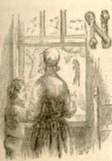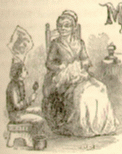
OW, Isaac," said Mrs. Partington, as she came into the room with a basket snugly covered over, "take our Tabby, and drop her somewhere, and see that she don't come back again, for I am sick and tired of driving her out of the butter. She is the thievinest creatur! But don't hurt her, Isaac; only take care that she don't come back."
Ike smiled as he received his charge, and the old lady felt happy in getting rid of her trouble without resorting to violence. She would rather have endured the evil of the cat, great as that evil was, than that the poor quadruped should be inhumanly dealt with. She saw Ike depart, in the dusk of the evening, and watched him until he became lost to view in the shadow of a tree. It was a full half hour before he returned with his empty basket, and an unusual glee marked his appearance, -- it sparkled in his eye, it glowed in his cheek, it sported in his hair, -- and Ike looked really handsome, as he stood before the dame, and proclaimed the success of his mission.
"Did she drop easy, Isaac?" asked the old lady, looking upon him kindly, "and won't she come back?"
"She dropt just as easy!" said Ike, letting his basket fall on the floor, and shying his cap upon the table, somewhat endangering a glass lamp with a wooden bottom that stood thereon; "she dropt just as easy! and she won't come back -- you may bet high on that."
"But you didn't beat and mangle her, Isaac, did you? If you did I should be afraid she would come back and haunt us -- I have heard of such things"; and she looked anxiously in his face; but, detecting there no trace of guilt, she patted him on the head, and parted his hair, and told him to sit down and eat his supper, which the young gentleman did with considerable unction.
"Isaac! Isaac!" screamed Mrs. Partington, at the foot of the little stairway that led to the attic where the boy slept, the next morning after the above occurrence. "Isaac!" -- and he came down stairs slowly, rubbing his eyes as he came. She had disturbed his morning nap.
"Isaac," said she, "what is that hanging yonder to a limb of our apple-tree?" One scattering tree, as she said, constituted her whole orchard, unless she counted the poplar by the corner.
"I can't see so fur off," said Ike, still rubbing his eyes.
"Well, I should think it was a cat; and it looks to me like our Tabby. O, Isaac! if you have done this!" and a tone akin to horror trembled in her voice.
"I'll go and see if it's her," said Ike, as if not hearing the last part of her remark; and he dashed out of the door, but soon came back, with wonder depicted on every feature of his expressive countenance. "O, it's her! sure enough, it's her!" cried he, "but I did drop her!"
"Well, how could she come there then?" and the good old lady looked puzzled.
"I'll tell you how I guess it was," said Ike, looking demurely up. "I guess that she committed suicide, because we was going to drop her; they are dreadful knowing critters, you know."
"True enough," replied the old lady, while something like a tear glistened in her eye -- her pity was excited; "true enough, Isaac, and I dare say she thought hard of us for doing it; but she had n't ought to if she'd have considered a minute."
Ike said no more, but went out and cut down the supposed suicide, with a serious manner, and buried her beneath her gallows, deep down among the roots of the old tree, and she never came back.
The old lady told the story to the minister, and Ike vouched for it, but the good man shook his head incredulously at the idea of the suicide, and looked at the boy. He very evidently understood how the cat was dropped.
 ORAL
training," said Mrs. Partington, "is the best, arter all."
She had heard some one in the omnibus speaking of moral
training, and her benevolence gave it into the charge of
memory until she got home, and memory revolved it, and
pondered it, and reviewed it, and fancy construed it to
mean something about the military training that was to come
off the next day.
ORAL
training," said Mrs. Partington, "is the best, arter all."
She had heard some one in the omnibus speaking of moral
training, and her benevolence gave it into the charge of
memory until she got home, and memory revolved it, and
pondered it, and reviewed it, and fancy construed it to
mean something about the military training that was to come
off the next day."I hope it will be a moral training, I'm shore," said she; "for I see the Gov'nor is to be there in his new suit, and I hope they'll make their revolutions well before him. I do admire the millintery, where the sogers in their fancy unicorns look jest like a patchwork quilt. They was n't moral trainings in old times, when men put 'enemies into their heads to steal away their hats,' as Mr. Smooth, the schoolmaster, used to say. Your Uncle Paul had a good deal of millintery sperrit sometimes, Isaac."
Ike had remained very quiet while she was speaking.
"What upon airth are you doing there, Isaac?" cried she.
The young gentleman readily told her he was painting a horse, at the same time displaying an animal, nominally of that description, done beautifully in blue, which he appeared to look on with much satisfaction.
"But what are you painting it with? As true as I'm alive you've got your Uncle Paul's tompion that he used to wear in his cap so long ago, and you're using up all my bluing!"
That pompon, saved for so many years, to be used for such a purpose! Ah, Ike, Ike! we fear the old lady will have sad times with thee yet. Why didst thou, yester even, secrete the large ball of yarn for thine own purposes, which to-morrow she will seek for in vain? Say, why?
